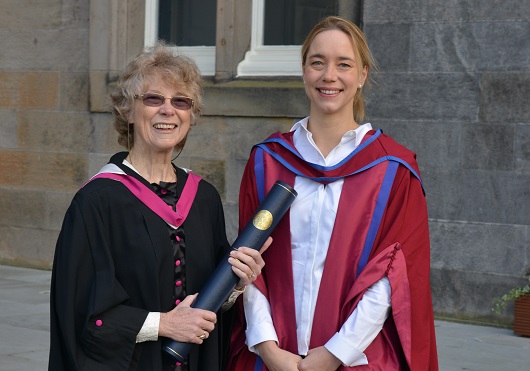Laureation address: Professor Cheryl Elisabeth Praeger

Laureation by Dr Colva Roney-Dougal
School of Mathematics and Statistics
Vice-Chancellor, it is my privilege to present Professor Cheryl Elisabeth Praeger for the degree of Doctor of Science, honoris causa.
Cheryl was born in Toowoomba, a regional town in south-east Queensland, Australia. Her interest in the sciences began at high school, but she was told ‘You don’t want to do mathematics. Girls don’t pass’. Fortunately, Cheryl decided to ignore this advice, and during her undergraduate degree at the University of Queensland, she initially studied mathematics, physics and chemistry, before later focusing on mathematics.
A key early event was a summer vacation studentship at the Australian National University in Canberra, working with the eminent mathematician Professor Bernhard Neumann. It was then that she first got to experience the excitement of tackling an unsolved problem, and (despite being an undergraduate) wrote the very first of her now more than 350 research papers. The following year, Cheryl won a Commonwealth Scholarship to St Anne’s College, Oxford. Her doctoral adviser was Dr Peter Neumann, the eldest son of Bernhard Neumann.
By 1976, Cheryl had an appointment at the University of Western Australia, where she has been ever since, and at the age of 35 she became only the second ever female full professor of mathematics at an Australian university – at the risk of sounding repetitive, the first was Hanna Neumann, the wife of Bernhard and mother of Peter!
Cheryl has worked in many areas of mathematics, but the one to which she has contributed the most is the study of permutation groups and group actions. Indeed, her invited lecture at the 2002 International Congress of Mathematicians, the most prestigious conference in mathematics, was on the topic of permutation groups. The study of permutation groups dates back to the work of Galois in the 1830s on permutations of the roots of polynomials, so this area has a long and illustrious history. Cheryl has worked both on group actions in their own right, and as a tool for studying other structures, and her theory of finite quasiprimitive permutation groups opened up new directions in the study of highly symmetric graphs.
Upon her appointment to a professorship, Cheryl made a conscious decision to start working in the mathematics of computation, as she felt a responsibility to introduce computers into the teaching of mathematics, and knew that she would only have a serious interest in this if she also became an active researcher in the field. Her foundational 1992 paper with Peter Neumann presented an algorithm to test whether a matrix group over a finite field, given by a set of generating matrices, contains the special linear group. This paper is often credited with the birth of the Matrix Group Recognition Project, on which scores of researchers across the world have worked, and which is only now approaching completion.The list of honours awarded to Cheryl would take substantially longer than my allotted slot just to read out, so I shall single out a few. She was elected to the Australian Academy of Science in 1996, and is now its Foreign Secretary. She was made a Member of the Order of Australia in 1999. She was the first female president of the Australian Mathematical Society, and she is now a fellow of the American Mathematical Society, an Honorary Member of the London Mathematical Society, and an Honorary Life Member of the Australian Mathematical Society.
Cheryl has published with over 150 co-authors, despite facing initial pressure from senior figures, who felt that mathematics should be a solitary occupation. From the outset, she deliberately built up a strong group of interacting mathematicians at the University of Western Australia, which continues to flourish. This also was not at all the way in which mathematicians normally worked at the time. The research culture in mathematics has changed during Cheryl’s career, to my mind greatly for the better, and those of my generation are immensely grateful for her clear demonstration that there is more than one way to achieve research excellence.
Cheryl has a very internationalist mindset, and has deliberately cultivated mathematical contacts in the Philippines, Thailand, China and Iran, amongst many other countries. She believes strongly in helping less wealthy countries to upgrade their level of mathematical knowledge, and in particular continues to offer intellectual and practical support to their many female mathematicians. She was elected, in 2006, to the executive committee of the International Mathematical Union, and went on to become the Vice-President of the International Commission for Mathematical Instruction.
Cheryl’s intellect, energy, enthusiasm and integrity are an inspiration to us all.
Vice-Chancellor, in recognition of her major contribution to mathematics, I invite you to confer on Professor Cheryl Elisabeth Praeger the degree of Doctor of Science, honoris causa.
Category Awards